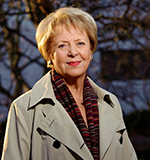The Language Strategy - Background
Motivation for initiating a language campaign
The Language Strategy should be seen as University of Copenhagen’s answer to a number of pressing questions about language skills:
- The public debate had for some time treated the increasing lack of language skills as a problem.
- The job market openly demanded applicants and candidates with better language skills.
- Teachers of higher education stated that students did not have the same level of language skills as earlier.
- Students claimed that they lacked language skills in certain situations.
- Internationalisation and globalisation had and still have a very central place on the agenda in most societal contexts, and that carries with it an expectation of ever increasing competences in language.
Strategic measures
Based on these questions, University of Copenhagen gave language priority in its formal strategy:
[We aim to] Work to improve students’ and employees’ language skills, also in
foreign languages other than English. (Strategy for the University of Copenhagen, 2016, p.31)
To realise this aim the then Rector summoned relevant parties from across the university to a seminar 31 January 2012 with the purpose of discussion needs and options. As his next step, Rector set up his Language Strategic Committee to work out how best to fulfil the aim of the strategy. All faculties, the Student Council and University Education Services were represented in the committee, which submitted its report in April 2013 with the overall recommendation that a separate language strategy be established as a research-supported project. The general mission of the strategy was to strengthen language skills for students outside the language programmes and to look into the needs and possibilities for integrating language skills in all the study programmes of the university.
The Language Strategic Committee’s recommendations were approved by the university’s management team 29 May 2013, and the Language Strategy was established as a five-year project running from 1 August 2013 to 31 July 2018.
Read about the organisation of the project and its governance here.
Language sustainability
Vigdís Finnbogadóttir was the president of Iceland from 1980 to 1996. Vigdís Finnbogadóttir is now UNESCO Goodwill Ambassador for promotion of the world’s languages, and she has fulfilled the role of patron of the Language Strategy at UCPH.
About governance
The Language Strategy har been effectively organised as a cross-faculty project. Click here to see the details.
The steering committee
The language strategy has been supervised by a cross-faculty steering committee. Click here for a list of members of the steering committee.

